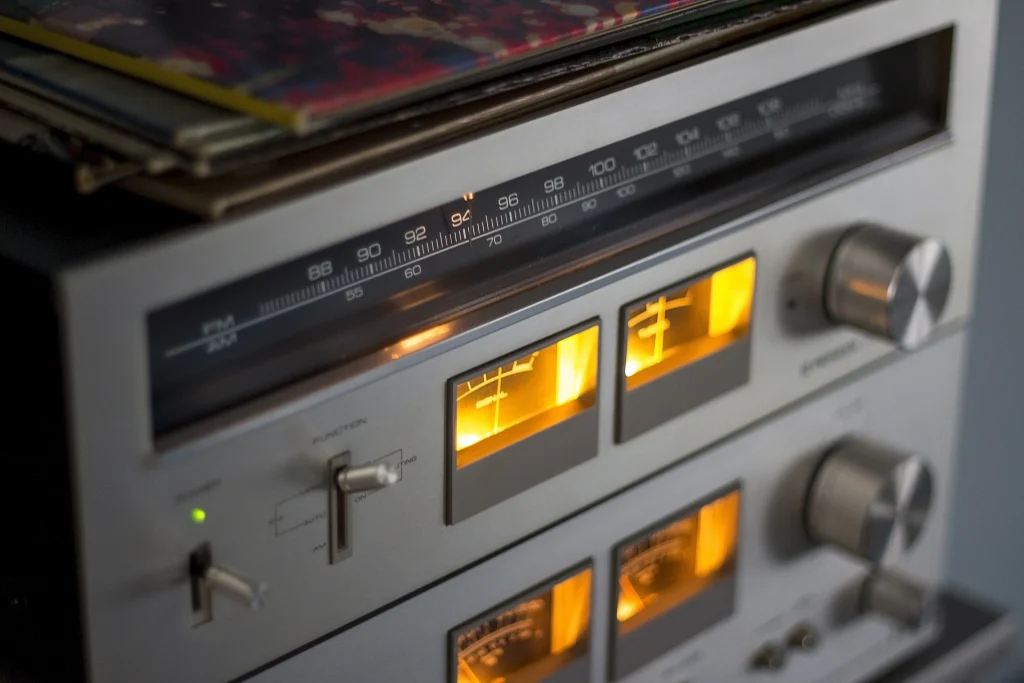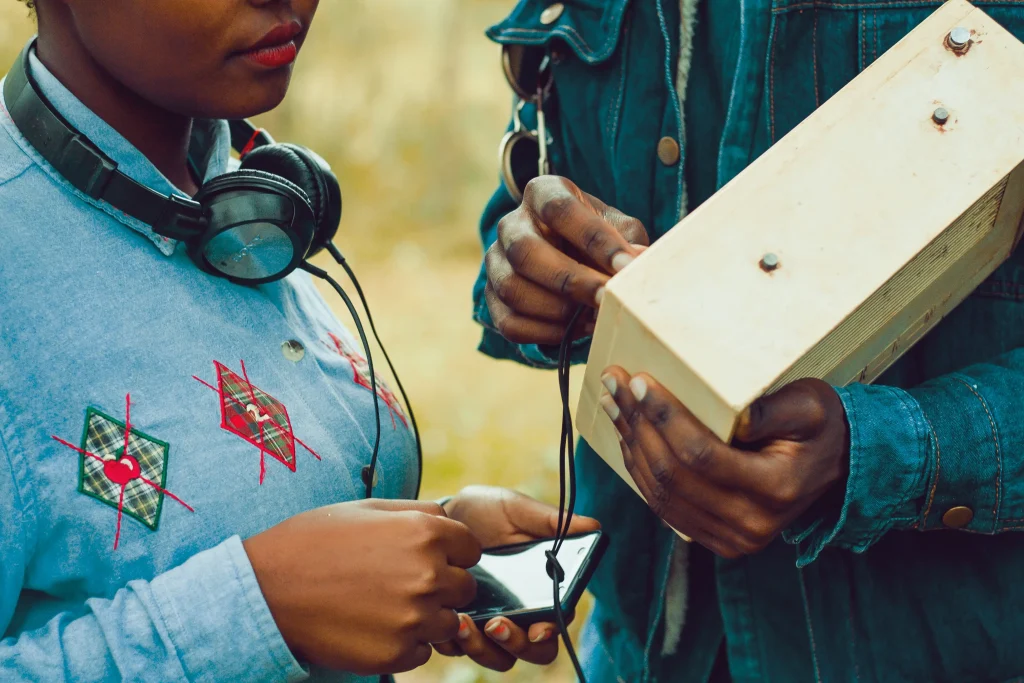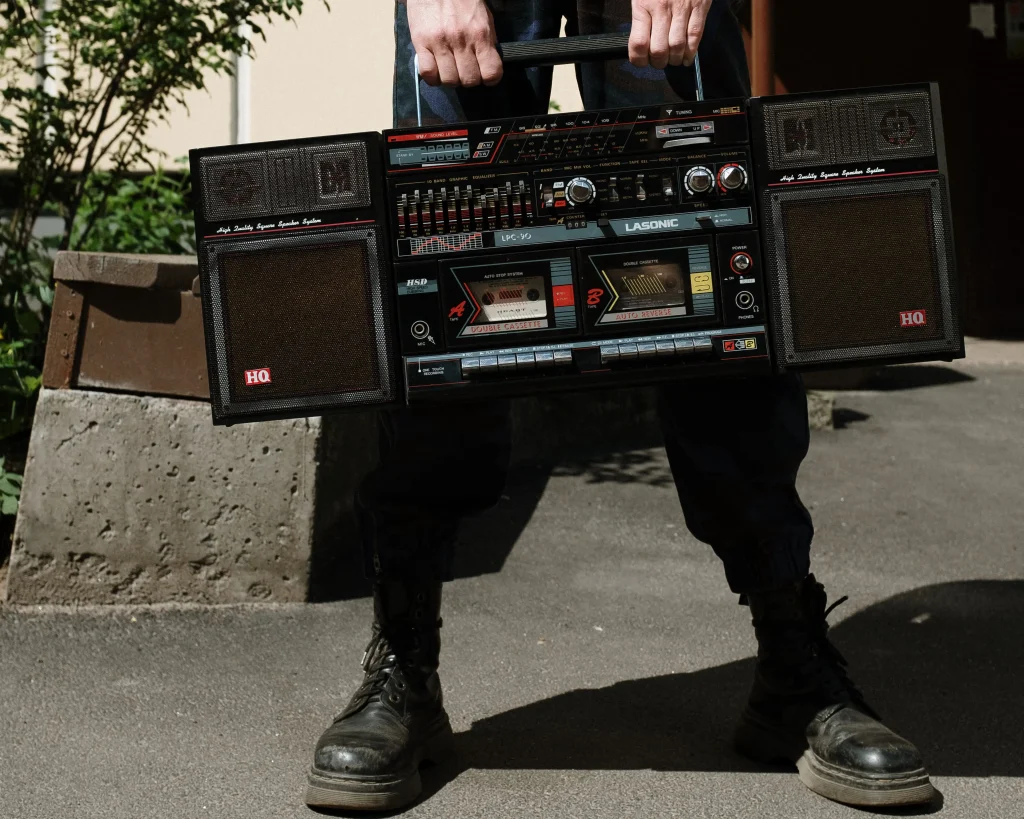Check, check…1,2! Check!
The 13th of February is World Radio Day, and here at Sandton Central we’re celebrating this monumental medium with great tunes, engaging conversation, and incredible signal. Why? Because we’ve got several radio broadcasters dotted throughout our diverse precinct, and they keep dominating the airwaves in ways that inform, entertain, and improve the lives of their listeners.
Amongst the broadcasters who find their home in our community are 94.7 Highveld Stereo, YFM, Primedia, Radio 702, and EVOGUE Radio! We’re taking a brief look at the history of radio, what keeps the medium relevant in Africa specifically, and how World Radio Day is intended to be celebrated.
What is the history of radio?

Radio as we know it today developed from a technology called “wireless telegraphy,” which is described as the “transmission of text messages by radio waves, analogous to electrical telegraphy using cables.” In 1864, a clever fellow by the name of James Clerk Maxwell, presented a paper that showed off his ideas about electromagnetism, claiming – with mathematical proofs, of course – that light, radio and x-rays were all types of electromagnetic waves propagating through free space.
On the back of those theories, another rather clever chap who went by Heinrich Rudolph Hertz, showed off his experiments transmitting radio waves through the air, proving Maxwell’s theories to be concretely true. After some blundering around by the scientific community to use these radio waves to (unsuccessfully) transmit light signals, a young, brilliant mind belonging to one Mr Georgio Marconi, began working on a gadget to transmit radio waves a long distance.
In August 1985, he cracked the code and the first long-range radio transmitter was created. It was only by 1900 that Canadian-American inventor Reginald Fessenden figured out how to use this technology to transmit sounds, and by 1907, American inventor Lee de Forest, worked out how to make these audio transmissions audible enough to play a piece of music.
The very first regular radio broadcast for entertainment purposes happened in 1919, originating from Nederlandsche Radio-Industrie and its owner engineer, Hanso Idzerda. Dutch people have always been the coolest. The immensely popular program was broadcast four nights a week. More such entertainment broadcasts arose internationally, and by 1920 there were tons of companies and organisations broadcasting their own radio programs.
In fact, the very first live broadcast of a full operatic performance and a sporting event took place in the same month, November 1920! The medium continued to rapidly develop globally as an accessible form of information. And even as more visual broadcasting mediums such as film and television began to rise in popularity, radio didn’t disappear. To this day, it remains the primary source of news, music, entertainment and communication to millions across the globe.
What is the role of radio broadcasting today?

In Africa specifically, broadcast radio still remains the most prevalent form of long-distance communication used by the continent’s citizens. Radio transmissions have the widest geographical reach and the greatest audiences compared with the Internet, television and newspapers. It’s also totally free, creating complete accessibility without sitting behind a paywall. You don’t need airtime or data to access a radio broadcast, just a simple device and a frequency to look up.
Radio broadcasts aren’t elitist whatsoever, as they reach everyone within the broadcasting distance, regardless of their class, race, age, gender or demographic. This means an equal playing field is created upon which to play out the marketplace of ideas. In many places in Africa, radio is the only media option that’s delivered in the area’s vernacular languages, making it a crucial medium through which to communicate nutrition information for mothers, medical updates for health workers, how to avoid a viral infection during an outbreak, conservation farming for farmers, or school lessons for children, to name a few applications.
Radio broadcasting is an incredible way to build communities, uniting people in the broadcasting area under the exact same message, free of charge. Radio stations are also relatively low-cost to start up as an independent creative with something to say. As opposed to a film and television distribution studio, for example, a small home radio setup is achievable for the aspiring small business owner. It’s also a load of fun having total control of the playlist! Pass us that aux cable!
How is World Radio Day celebrated?

To honour where radio came from and what it still represents to the world, especially developing communities, on the 14th of January 2013, the United Nations General Assembly formally endorsed UNESCO’s (United Nations Educational, Scientific and Cultural Organization) proclamation of World Radio Day the following month.
The day is intended to raise awareness amongst the public and the commercial sector of the importance of developing and maintaining radio-based channels of communication and broadcasting. On this day, decision-makers in our society should be encouraged to keep transmitting information and entertainment through radio channels, to keep that information accessible to everyone. Cooperation and networking between broadcasters are also encouraged because they keep the radio broadcasting space dynamic and progressing.
To do your part to encourage the growth of South African radio in conjunction with Sandton Central, tune in to one of the exciting radio stations that broadcast right from within the heart of our area. Lose yourself in the great music, insightful discussions and TOTALLY cost-free information one simple device gives you for a day.
You might even find your passion for radio reignited, or discover a broadcasting personality or segment that really resonates with your preferences and floats your boat along the soundwaves! Happy World Radio Day!


